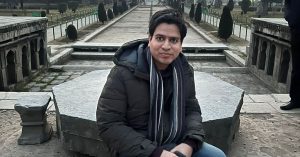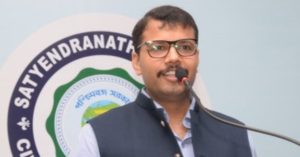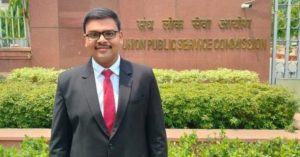‘I Was a Doctor; A Tragedy Motivated Me to Quit Medicine & Become an IPS Officer’
Dr Ram Gopal Naik, a doctor-turned-IPS officer, has many achievements in his name. Awarded the President’s Police Medal for Gallantry after rescuing a five-year-old, the Hindi-film industry has also decided to make a movie inspired by his story.
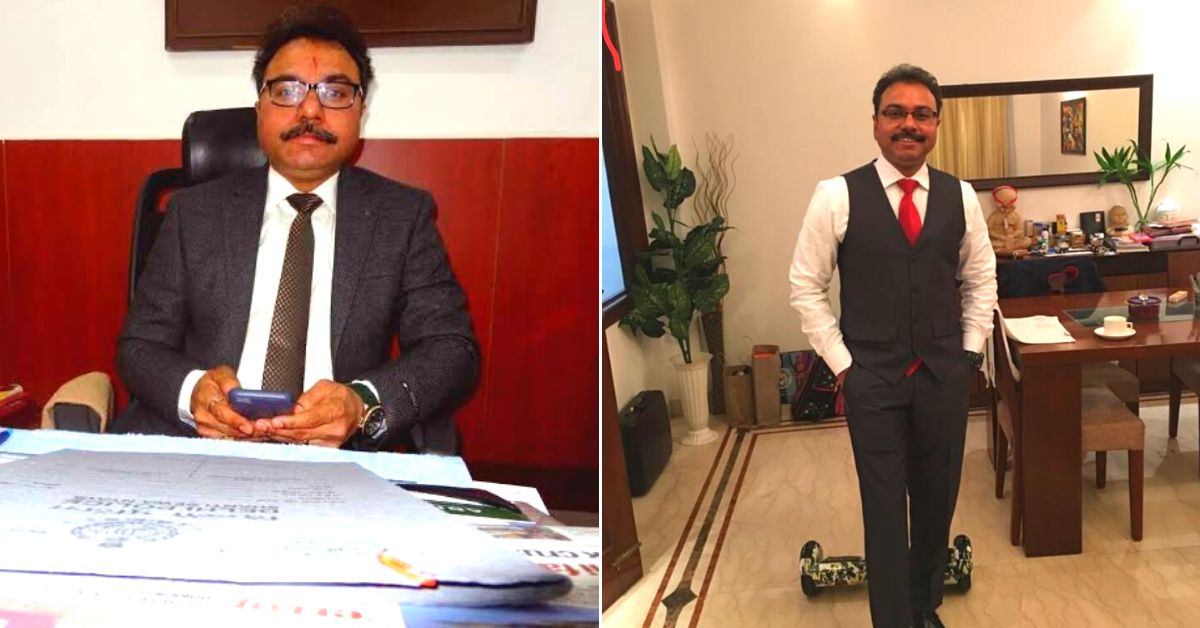
In recent months, films like Vidhu Vinod Chopra’s 12th Fail and The Viral Fever (TVF) web series Aspirants have captured the imagination of a million Indians. At the heart of their appeal lies a narrative of struggle, redemption, and prestige that comes from passing one of the toughest competitive examinations in the world—the UPSC (Union Public Service Commission) Civil Services Examination (CSE)—and the life this landmark achievement follows. (Above image of Dr Ram Gopal Naik, a 2002-batch IPS officer)
Thus, it comes as no surprise that plans are afoot yet again in the Hindi film industry to make a movie based on the life and career of Dr Ram Gopal Naik, a 2002-batch officer of the Indian Police Service (IPS). Portraying the doctor-turned-police officer’s eventful life is Imran Zahid, an actor who recently played the role of a young man from a small town in Bihar who dreams of becoming an IAS (Indian Administrative Service) officer in the 2023 film Ab Dilli Dur Nahin.
Also starring veteran filmmaker Mahesh Bhatt, this movie was inspired by the real-life story of Govind Jaiswal, a rickshaw puller’s son who became an IAS officer in 2007.
Speaking to The Better India, Dr Naik, who is currently the DCP (deputy commissioner of police), Metro Police, in the national capital, says, “The news came as a major surprise. It was an emotional moment for my wife and children. They were so excited. Based on real-life incidents, a movie about my life will motivate my staff further. After all, it’s a real form of recognition for our work. As an officer, I can be a role model for them.”
Meanwhile, speaking about playing a real-life character, Imran says, “Whenever you portray a living person in a performance, it becomes an authoritative portrayal of their experiences: their motivations, the challenges they confronted, and how they overcame their struggles.”
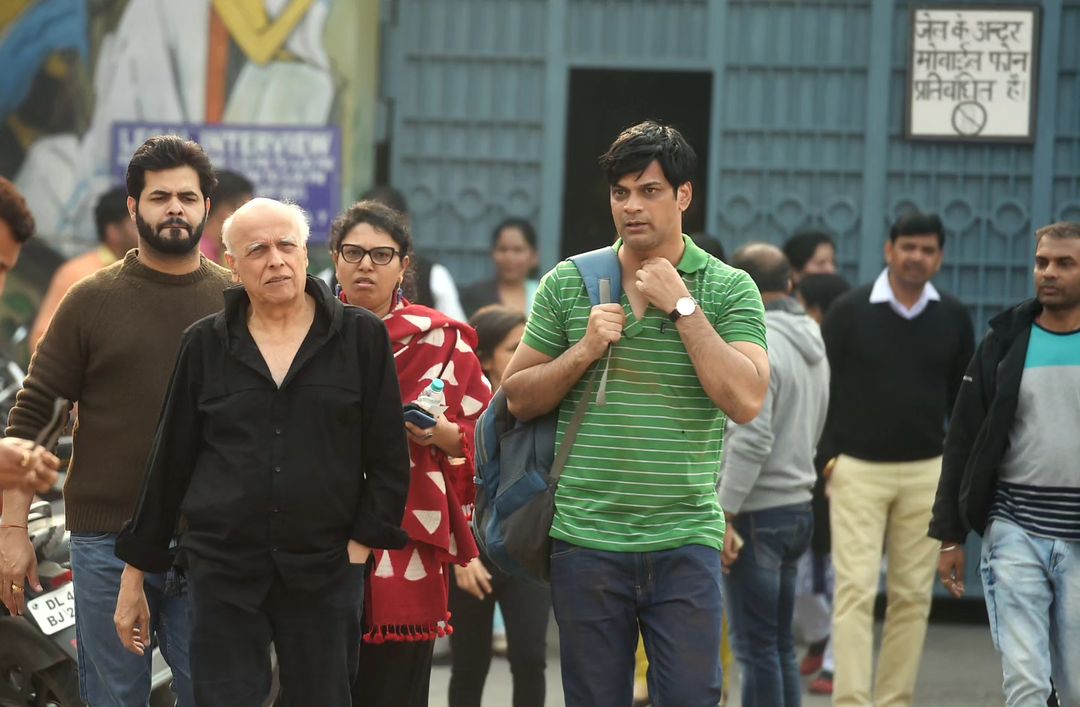
Choosing IPS over medicine
Born in Guntur, Andhra Pradesh (AP), Dr Naik grew up in an upper-middle-class family where his father served as an officer in the customs and central excise department, while his mother was a homemaker. Like thousands of youngsters in AP, his initial goal was to become a doctor.
It was during his third year of medical school studying MBBS that he decided to prepare for the central civil services exam. However, what inspired this decision was a personal tragedy.
While studying at the Andhra Medical College in the early 1990s, his brother-in-law was murdered following a business rivalry. A shocking development, it left his family dealing with a crisis. But, amid this crisis, he saw something that would leave an indelible impression.
“There were many influential people with notorious criminal backgrounds involved in this murder case. Fortunately, we had a very good police officer who fairly investigated the case. In this case, I saw the best of what a police officer can do and the impact they can have on our society. As an officer of the law, he was able to help our family, manage other professionals engaged in this investigation, and nab the culprits as well. Instead of becoming a doctor, I felt I could be more useful to society as a police officer,” recalls Dr Naik.
While Dr Naik struggles to recall the name of the officer who solved his brother-in-law’s murder more than 30 years after it happened, he cannot forget the impression the episode left behind. Of course, with other family members in and out of the service motivating him to make that transition to a career in the IPS, this memory remained seared in his consciousness.
After completing his MBBS in 1996, he served as a doctor for three years until 1999 when he decided that he needed a complete shift away from a career in medicine.
“From my third year onwards, I began preparing for the UPSC exam. I was simultaneously studying for my MBBS and preparing for the Union Civil Services exam. Following my MBBS, I worked at a private hospital in Visakhapatnam for a short while before leaving for Hyderabad to join UPSC coaching classes. To support myself financially, however, I even worked at the Apollo Hospital in Jubilee Hills as an emergency physician,” he recalls.
“My decision to quit medicine and prepare [full-time] for the UPSC exam was met by vehement opposition in the family. They wanted me to continue as a doctor and earn well,” he adds.
In his first attempt, Dr Naik reached the interview stage but missed out. But helping him along the way were a few friends he had known since primary school. They were also preparing for it.
“They supported me a lot. They could not get through but they were happy that I did,” he says.
Their faith in Dr Naik would eventually pay off as he cleared the interview stage in his next attempt. He joined the IPS in 2002 as part of the DANIPS (Delhi, Andaman & Nicobar Islands, Lakshadweep, Dadra, and Nagar Haveli and Daman and Diu Police Service) cadre.
Since becoming an IPS officer, Dr Naik has gone on to achieve a great deal. From receiving a special commendation from the Andhra Pradesh government for organising relief operations after Cyclone HUD HUD in 2014 to investigating and extraditing Sanjeev Chawla, the bookmaker famously involved with the deceased cricket player Hansie Cronje, in fixing matches between India and South Africa in 2000, Dr Naik has many achievements to his name.
Other notable achievements include initiating the modernisation process of the Lakshadweep Police during his first official posting and investigating and solving the 2008 bomb blasts in the M-Block Market of Greater Kailash, New Delhi. In 2018, he also solved the paper leak case of the CBSE Class 12 economics and Class 10 mathematics examinations.
In 2021, he won the President’s Police Medal for Gallantry in January 2021 for conducting a daring rescue operation of a kidnapped 5-year-old boy in Sahibabad, Uttar Pradesh (UP). During his career, he has investigated a plethora of cases but this one stands out.
Ram Gopal Naik, DCP Crime Branch: Delhi Police Crime Branch with help of Ministry of External Affairs and Home Affairs was trying to get him (Sanjeev Chawla).In 2013, extradition process started. We have got 12-days custody.We have not yet questioned him,process will start now. pic.twitter.com/I4yOF3swVS— ANI (@ANI) February 13, 2020
Rescuing a child
On 25 January 2018, as preparations for that year’s Republic Day celebrations were in full force, a five-year-old son of a prominent businessman in Northeast Delhi was kidnapped.
According to a report by The Indian Express, “Before the kidnapping, the accused conducted a recce of the area for over a month and decided to target the school bus. They made three failed attempts on January 21, 22 and 23.” Speaking to the media, the then JCP (Crime Branch) Alok Kumar identified the accused as Nitin Sharma, Ravi Kumar, and Pankaj alias Singh Saheb.
He also said the three suspects had hatched a plan to kidnap the child after “Sunny Gupta, father of the child, recently finalised a real estate deal of Rs 60 lakh. The details of the deal were common knowledge of everyone who stayed in Gupta’s locality GTB Enclave. Nitin thought he could earn a good ransom if he kidnapped Gupta’s son.”
On the morning of 25 January, when the school van was approaching the school, the kidnappers intercepted it and snatched the boy for ransom. The kidnappers shot the driver in the leg and took the boy to a two-bedroom flat in Sahibabad’s Shalimar City apartments.
“At the time, I was working as DCP of Delhi Police Crime Branch. Initially, the case was taken up by the local police. For a week, the local police could not get any leads. Given that the incident happened a day before Republic Day, there was a lot of pressure on the Delhi Police Commissioner to solve this case and rescue the boy. My commissioner took a call that the case should be transferred to the Crime Branch and I was selected to handle this sensitive investigation given that a boy’s life was at stake,” he says.
Once Dr Naik’s team took over the case, they deployed their sources on the ground and brought on officers with “good knowledge of criminal networks in Northeast Delhi”.
“One of our officers eventually got a lead that three persons were missing in the area where the boy was picked up and that they may be involved in the case. We also went through their criminal records and posited that they could be involved. Meanwhile, we also kept in touch with the father of the boy who was receiving calls for a ransom. Besides these calls, he was also receiving videos [on WhatsApp] of the kidnappers claiming that they have his son and voice recordings too where he could hear his son pleading to say, ‘Papa, I love you’,” he says.
Besides dealing with kidnappers, they also had to deal with a terrified father.
“He probably felt that cooperating with the police would put his son’s life at risk. Thus, he wasn’t being very cooperative. The kidnappers had demanded Rs 60 lakh as ransom and we asked him to negotiate to buy some time and trace these calls. But we believe he was actively hiding things from us. We discovered that he was even arranging the money to pay off the kidnappers so that his child could come back home,” he says.
So, Dr Naik recalls that his team “engaged in some ethical hacking” of the father’s phone so that they could have first-hand information about what was being discussed. Meanwhile, the kidnappers set a date and location for the exchange. After this conversation, Dr Naik took the father into confidence and assured him that they would rescue his child.
Speaking to The Statesman at the time, Dr Naik said, “As ransom calls were also made from nearby areas we selected a few areas and kept a close watch on a few suspects there. Meanwhile, through local sources and technical surveillance, police identified Nitin as a prime suspect. Police kept track of his activities and deployed sources to keep a closer watch on him.”
“When we shared Nitin’s pictures with the victim’s father, he identified him as a frequent visitor of the area,” Naik noted. After a thorough investigation, he was identified as one of the kidnappers.
After taking the father into confidence, Dr Naik learned that Nitin was attending a wedding in Northeast Delhi. In response to this news, Dr Naik and his team attended this wedding pretending to be guests. At the wedding venue, one of the officers identified the main suspect.
Initially, they thought of nabbing him there but decided against this move because of the commotion it would create. Instead, they trailed his car out of the venue.
In his conversation with The Statesman, Dr Naik said, “Police started following Nitin from 8 pm [on 5 February 2018] till 12.30 midnight [when he was intercepted]. He was driving his Swift at speeds close to 90 km/hr to 100km/hr. Police followed him on four bikes and four vans.”
After the main suspect dropped his girlfriend at her residence, the police continued trailing him.
Again, Dr Naik added, “Around 12.30 am, Nitin was intercepted near a community block in Seemapuri [near the Delhi-UP border]. Before his vehicle stopped, he hit our vehicle and he was drunk. He was also carrying three mobile phones. On interrogation, he told police that two of his friends had kept the child in a flat in Shalimar City in Sahibabad.”
After getting the main suspect to confess where they were keeping the boy, there were discussions among senior officers who were informed of the interception that they should wait to gather more force (personnel). Dr Naik disagreed and said that there was no time and they needed to move fast with the suspect in their custody.
“Moreover, his phones are with us and if he is unreachable, his accomplices may get alerted, leave the apartment, and possibly harm the boy as well. Thankfully, my top boss at the Delhi Crime Branch trusted my instincts,” he says.
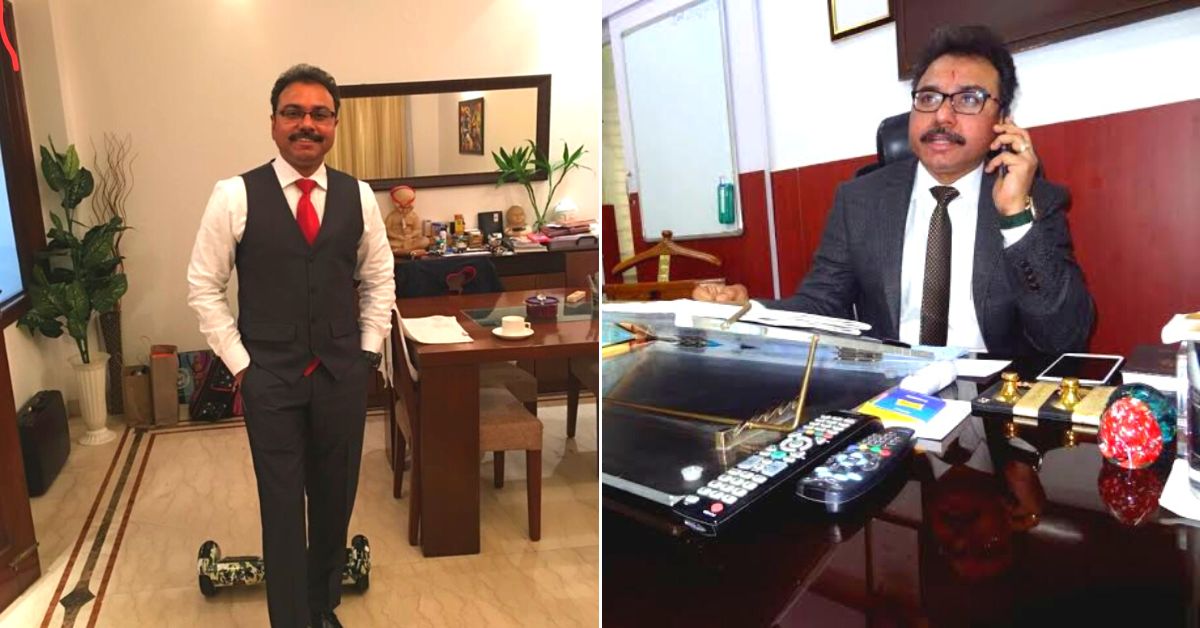
In barely 1.5 hours, Dr Naik’s team reached the apartment complex, did a complete recce of it, covered all the exits, got into the flat amidst a firefight, and rescued the boy. To understand the layout of the two-bedroom apartment, Dr Naik and two other officers visited another apartment in the same complex and asked the family residing inside if they could take a look.
“Once we understood the layout of this apartment, we took positions outside the fifth-floor flat where the child was being kept. Meanwhile, we also had a team prepared below with blankets and nets ready in case the kidnappers tried to throw the boy off the balcony. At this crucial juncture, we decided to send the suspect to ring the bell,” he recalls.
The main suspect Nitin proceeded to ring the bell, but the moment his accomplice opened the door he sensed that something was wrong and tried to shut it immediately.
“As he was about to shut the door, I told one of my officers that we had to break these doors down. Luckily, there was a little gap on top of the iron grill door. One of my officers was able to bend the iron grill part of the door down and that left enough space for me to enter. Following this, the kidnappers inside began firing at us,” he recalls. As per news reports, a bullet hit Inspector Vinay Tyagi’s vest, while another hit commando Kuldip Singh.
Amidst this chaos, Dr Naik climbed over the bent iron grill and took a peek at the gap left behind by a second wooden door inside to see if the child was inside the main hall of the flat.
“I found that the boy wasn’t there. That’s when I ordered the personnel behind me to fire back. There was an exchange of fire. One of the kidnappers was shot down on the ground lying in a pool of blood while the other was shot in the leg. My team immediately followed me inside while I went straight to the bedroom to find the child under a blanket,” he recalls.
Suffice it to say, the child was terrified following the exchange of fire outside. “I slowly took down the blanket and told him, ‘Beta, mein police uncle hoon. Mein tumhare papa ke paas le jaane ke liye aaya hoon.’ After hearing those words, he immediately jumped off the bed and hugged me. I carried him out of the flat covering his eyes. As we were driving to GTB Hospital, I called up his father and told him that we had rescued his child safely. This was around 2 am in the wee hours [of 6 February 2018]. The father was asleep when we called him,” he recalls.
Meanwhile, among the other two suspects inside the flat, one was killed while the other was injured. The police personnel injured by gunshots were saved by their bulletproof vests.
“All of us made our way to GTB Hospital. After the doctor on duty confirmed that the child had not suffered any serious injuries or abuse, the parents took him into their arms. It was an emotional moment seeing these tearful parents reuniting with their son. I also shed a tear. Four officers, including me, received the President’s Police Medal for Gallantry,” he recalls. If you found our stories insightful, informative, or even just enjoyable, we invite you to consider making a voluntary payment to support the work we do at The Better India. Your contribution helps us continue producing quality content that educates, inspires, and drives positive change. Choose one of the payment options below for your contribution- By paying for the stories you value, you directly contribute to sustaining our efforts focused on making a difference in the world. Together, let’s ensure that impactful stories continue to be told and shared, enriching lives and communities alike. Thank you for your support. Here are some frequently asked questions you might find helpful to know why you are contributing?

While the life of a police officer has its share of controversy and disappointments, it’s moments like these that make the journey worth it. Seeing that tearful reunion between the parents and their son, “and the fact that you made it possible”, is what makes this path worth it.
(Edited by Padmashree Pande; Images courtesy Dr Ram Gopal Naik and Instagram/Imran Zahid)
This story made me
- 97
- 121
- 89
- 167




